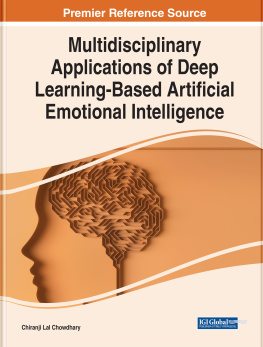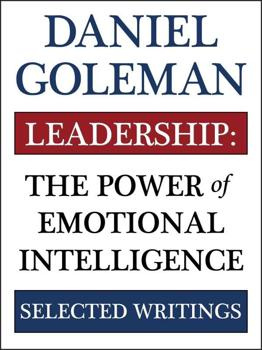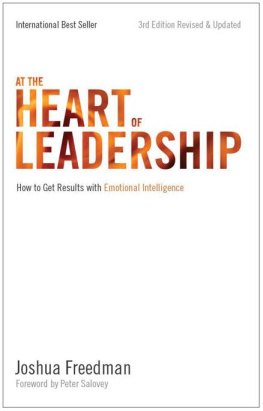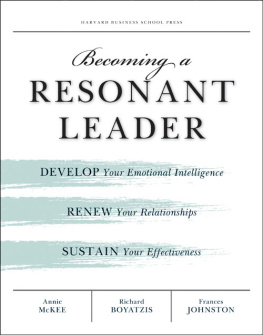Boyatzis Richard E. - Primal Leadership: Learning to Lead with Emotional Intelligence
Here you can read online Boyatzis Richard E. - Primal Leadership: Learning to Lead with Emotional Intelligence full text of the book (entire story) in english for free. Download pdf and epub, get meaning, cover and reviews about this ebook. year: 2013, publisher: Harvard Business Press, genre: Business. Description of the work, (preface) as well as reviews are available. Best literature library LitArk.com created for fans of good reading and offers a wide selection of genres:
Romance novel
Science fiction
Adventure
Detective
Science
History
Home and family
Prose
Art
Politics
Computer
Non-fiction
Religion
Business
Children
Humor
Choose a favorite category and find really read worthwhile books. Enjoy immersion in the world of imagination, feel the emotions of the characters or learn something new for yourself, make an fascinating discovery.

- Book:Primal Leadership: Learning to Lead with Emotional Intelligence
- Author:
- Publisher:Harvard Business Press
- Genre:
- Year:2013
- Rating:3 / 5
- Favourites:Add to favourites
- Your mark:
- 60
- 1
- 2
- 3
- 4
- 5
Primal Leadership: Learning to Lead with Emotional Intelligence: summary, description and annotation
We offer to read an annotation, description, summary or preface (depends on what the author of the book "Primal Leadership: Learning to Lead with Emotional Intelligence" wrote himself). If you haven't found the necessary information about the book — write in the comments, we will try to find it.
Primal Leadership: Learning to Lead with Emotional Intelligence — read online for free the complete book (whole text) full work
Below is the text of the book, divided by pages. System saving the place of the last page read, allows you to conveniently read the book "Primal Leadership: Learning to Lead with Emotional Intelligence" online for free, without having to search again every time where you left off. Put a bookmark, and you can go to the page where you finished reading at any time.
Font size:
Interval:
Bookmark:
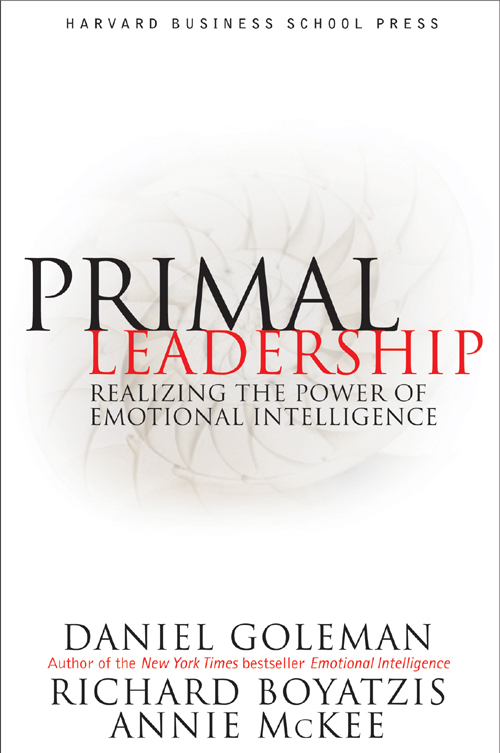
Copyright 2002 Daniel Goleman
All rights reserved
First eBook Edition: April 2004
ISBN: 978-1-591-39184-5
To Tara, Sandy, and Eddy,
our respective spouses,
for helping us to learn
about resonance
and emotional intelligence
in a lifelong love
W EVE WRITTEN this book in large part because of the unprecedented, enormously enthusiastic reader response to the Harvard Business Review articles What Makes a Leader? and Leadership That Gets Results. But this book goes far beyond those articles to advance a new concept: primal leadership. The fundamental task of leaders, we argue, is to prime good feeling in those they lead. That occurs when a leader creates resonancea reservoir of positivity that frees the best in people. At its root, then, the primal job of leadership is emotional.
We believe this primal dimension of leadership, though often invisible or ignored entirely, determines whether everything else a leader does will work as well as it could. And this is why emotional intelligencebeing intelligent about emotionsmatters so much for leadership success: Primal leadership demands we bring emotional intelligence to bear. In this book we show not just why emotionally intelligent leadership drives resonance, and thus performance, but also how to realize its powerfor the individual leader, in teams, and throughout entire organizations.
Perhaps uniquely among management theories, the primal leadership model builds on links to neurology. Breakthroughs in brain research show why leaders moods and actions have enormous impact on those they lead, and shed fresh light on the power of emotionally intelligent leadership to inspire, arouse passion and enthusiasm, and keep people motivated and committed. Conversely, we sound a warning about the power of toxic leadership to poison the emotional climate of a workplace.
Each of us brings a different perspective to this task. For Daniel Goleman, the worldwide response to his books and his Harvard Business Review articles on leadership has brought invitations to speak with leaders around the world. In addition to his own worldwide speaking, Richard Boyatzis, as a professor at the Weather-head School of Management, has the advantage of in-depth research from fifteen years of guiding thousands of MBAs and executives through the challenge of cultivating the essential competencies of emotionally intelligent (EI) leadership. And Annie McKee, on the faculty of the University of Pennsylvania Graduate School of Education, consults to business and organization leaders worldwide and brings practical insights gained from her hands-on work helping dozens of organizations transform to foster emotionally intelligent leaders. We have woven our collective expertise together to offer a perspective that takes advantage of our diverse backgrounds.
Just what the many faces of primal leadership look like has become evident to us as weve talked with hundreds of executives, managers, and workers at companies and organizations around the world. We have encountered resonant leaders in organizations of every sort and at all levels. Some have no official leadership position, yet step forward to lead as needed, then fade back until another ripe moment arrives. Others head a team or an entire company, guide a start-up, catalyze change in their organization, or nimbly split away to start their own renegade venture.
Well share stories of many such leaders in these pages (some of whom we name, while others who spoke to us in confidence we have disguised). And weve confirmed these personal observations with data on thousands of leaders.
Weve been able to reap a rich harvest of data from other sources. Colleagues at the research arm of the Hay Group have shared with us two decades of analyses of leadership effectiveness done for their clients globally. In recent years, an expanding network of academic researchers has been gathering data with the ECI-360, our measure of the key emotional intelligence competencies for leadership. And from many other centers of research the body of findings and theory on emotional intelligence and leadership has been growing steadily.
From all these sources weve drawn answers to telling questions about primal leadership: What emotional resources do leaders need to thrive amidst chaos and turbulent change? What gives a leader the inner strength to be honest about even painful truths? What enables a leader to inspire others to do their best work and to stay loyal when other jobs beckon? How do leaders create an emotional climate that fosters creative innovations, all-out performance, or warm and lasting customer relationships?
For too long managers have seen emotions at work as noise cluttering the rational operation of organizations. But the time for ignoring emotions as irrelevant to business has passed. What organizations everywhere need now is to realize the benefits of primal leadership by cultivating leaders who generate the emotional resonance that lets people flourish.
Take, for example, the horrific catastrophe in New York, Washington, D.C., and Pennsylvania on September 11, 2001which occurred in the final days of writing this book. That calamity underscores the essential role of emotional leadership, particularly in moments of human tragedy and crisis. And it brings home the point that resonance goes beyond positivity, to cover the range of emotions. Consider Mark Loehr, CEO of SoundView Technology, a technology brokerage in Connecticut. A handful of friends, colleagues, and family members of people there were lost in the tragedy. Loehrs first response was to invite all employees to come to the office the next daynot to work, but to share their feelings and talk over what to do. Over the following days Loehr was there as people wept together, and he urged people to talk about what they were going through. Every night at 9:45 he sent out an e-mail to the entire company about the personal side of the ongoing events.
Loehr went a step further, encouraging and guiding a discussion of how to find meaning in the chaos through an action they could all participate in to help out. Rather than just making a group donation, they decided to donate their companys proceeds from one day of trading to those victimized by the tragedy. On an average day, that might be more than half a million dollars; the most they had made in a day was around $1 million. But as they spread the word of what they wanted to do to their clients, it inspired an amazing response: They raised more than $6 million that day.
To continue the healing process, Loehr also asked employees to compile a memory book to record their thoughts, fears, and hopes, which could be shared with future generations. There was an outpouring of e-mails with poems, moving stories, reflectionspeople speaking from their hearts.
In such a grave crisis, all eyes turn to the leader for emotional guidance. Because the leaders way of seeing things has special weight, leaders manage meaning for a group, offering a way to interpret or make sense of, and so react emotionally to, a given situation. Mark Loehr courageously performed one of the most crucial emotional tasks of leadership: He helped himself and his people find meaning and sense, even in the face of chaos and madness. To do so, he first attuned to and expressed the shared emotional reality so that the direction he eventually articulated resonated at the gut level, putting into words what everyone was feeling in their hearts.
What would our lives look like if the organizations where we spent our working days were naturally places of resonance, with leaders who inspired us? In most parts of the developing world best practices for business have not yet formed. Imagine what an organization would be like if these concepts of resonant leadership were founding principles rather thanas is usually the case in highly developed settingsa corrective. Then from the start hiring would focus on recruiting those with the EI skills for leadership, as would promotions and development. Ongoing learning for these leadership skills would be part of everyday operations, and the entire organization would be a place where people flourished by working together.
Font size:
Interval:
Bookmark:
Similar books «Primal Leadership: Learning to Lead with Emotional Intelligence»
Look at similar books to Primal Leadership: Learning to Lead with Emotional Intelligence. We have selected literature similar in name and meaning in the hope of providing readers with more options to find new, interesting, not yet read works.
Discussion, reviews of the book Primal Leadership: Learning to Lead with Emotional Intelligence and just readers' own opinions. Leave your comments, write what you think about the work, its meaning or the main characters. Specify what exactly you liked and what you didn't like, and why you think so.

